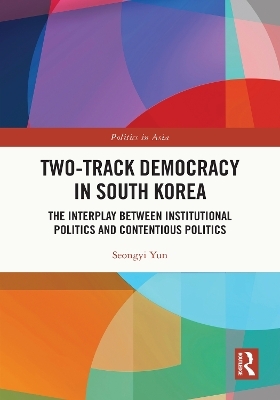
Two-Track Democracy in South Korea
The Interplay Between Institutional Politics and Contentious Politics
Seiten
2023
Routledge (Verlag)
978-0-367-42498-5 (ISBN)
Routledge (Verlag)
978-0-367-42498-5 (ISBN)
This book examines three ironic phenomena of South Korean democracy that have developed after its democratic transition in 1987. Yun proposed that the traditional hierarchical and elite-centered political system is no longer sustainable.
This book examines three ironic phenomena of South Korean democracy that have developed after its democratic transition in 1987. While the evaluation of South Korea’s political system by external institutions has steadily improved, people’s trust in the nation’s political system continues to decline. However, in the face of political distrust, unlike in Western democracies, voter turnout has increased. Even though political participation and the political influence of citizens have been strengthened over time, the political influence of civic organizations that fostered the initial democratization movement in the 1980s has weakened, parallel to the decline in citizens’confidence in these organizations.
Why is South Korean democracy witnessing ironic phenomena that cannot be succinctly explained by existing theories of political development or democracy? This book seeks these answers within the framework of a twotrack democracy, that is, the interplay between institutional and contentious politics. A model of democracy that combines contentious politics with formal politics can shed light on this phenomenon. Yun proposed that the traditional hierarchical and elite-centered political system is no longer sustainable. In order to resolve the democratic deficiency perceived by citizens, it is necessary to consider a new model of democracy beyond the improvement of representative democracy. Moreover, the new model of democracy should be based on a fusion of institutional politics and contentious politics.
The book will appeal to scholars and students interested in the politics of South Korea democratization and democracy more generally.
This book examines three ironic phenomena of South Korean democracy that have developed after its democratic transition in 1987. While the evaluation of South Korea’s political system by external institutions has steadily improved, people’s trust in the nation’s political system continues to decline. However, in the face of political distrust, unlike in Western democracies, voter turnout has increased. Even though political participation and the political influence of citizens have been strengthened over time, the political influence of civic organizations that fostered the initial democratization movement in the 1980s has weakened, parallel to the decline in citizens’confidence in these organizations.
Why is South Korean democracy witnessing ironic phenomena that cannot be succinctly explained by existing theories of political development or democracy? This book seeks these answers within the framework of a twotrack democracy, that is, the interplay between institutional and contentious politics. A model of democracy that combines contentious politics with formal politics can shed light on this phenomenon. Yun proposed that the traditional hierarchical and elite-centered political system is no longer sustainable. In order to resolve the democratic deficiency perceived by citizens, it is necessary to consider a new model of democracy beyond the improvement of representative democracy. Moreover, the new model of democracy should be based on a fusion of institutional politics and contentious politics.
The book will appeal to scholars and students interested in the politics of South Korea democratization and democracy more generally.
Seongyi Yun is a Professor at the Department of Political Science and was Dean of the College of Politics and Economics (2016-2020) at Kyung Hee University, Korea.
Introduction: Three Paradoxes in the Current South Korean Democracy
1 The Beginnings of Democracy and Retreat to Authoritarian Regimes
2 Democratic Transition and Democracy in Deficit
3 Consolidation of Democracy and Civil Society
4 Politics in the New Media Era: Concurrent Progress of Digital Activism and Institutional Participation
5 The Challenges Posed by Digital Activism to Political Institutions
6 Explorations of New Democracy Models in The New Media Age
References
Index
| Erscheinungsdatum | 07.02.2023 |
|---|---|
| Reihe/Serie | Politics in Asia |
| Zusatzinfo | 7 Tables, black and white; 3 Line drawings, black and white; 3 Illustrations, black and white |
| Verlagsort | London |
| Sprache | englisch |
| Maße | 156 x 234 mm |
| Gewicht | 510 g |
| Themenwelt | Geisteswissenschaften ► Philosophie |
| Sozialwissenschaften ► Politik / Verwaltung ► Politische Systeme | |
| Sozialwissenschaften ► Soziologie ► Spezielle Soziologien | |
| ISBN-10 | 0-367-42498-3 / 0367424983 |
| ISBN-13 | 978-0-367-42498-5 / 9780367424985 |
| Zustand | Neuware |
| Haben Sie eine Frage zum Produkt? |
Mehr entdecken
aus dem Bereich
aus dem Bereich
über Alltagsorte des sozialen Zusammenhalts
Buch | Softcover (2024)
transcript (Verlag)
CHF 33,55


